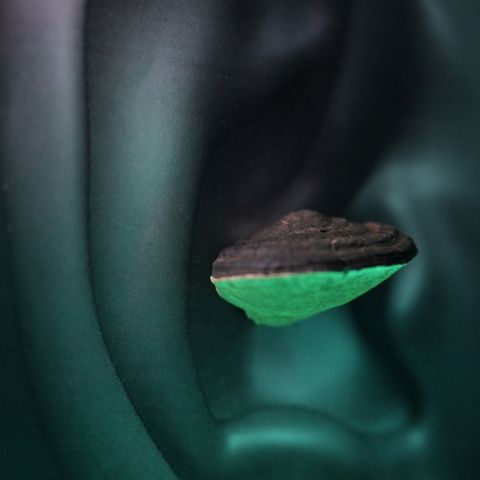
Info
As part of the education, artists from the MA program New Performative Practices (NPP) launch a joint podcast: fourteen individual episodes inviting the listener to audio spaces reflecting a wide...
show moreDuring 2020 and 2021, the artists in the NPP Master program were confined to digital spaces, communicating from several continents, and living through the global pandemic as they pursued their studies. Their choreographic and performative practices were challenged by time zones, proximity restrictions, international borders, care-giving responsibilities and an overwhelm of digital data. As the education switched to being mostly online, the students began to experiment with the relation between digital media and live presence. What would have been studio visits became ‘radio visits,’ and the question of how to share experience without proximity, or how to create proximity in separate spaces, became central challenges. The Audioreflection pod answers these challenges by proposing an audio space where listening is an artistic act to be shared, like touch, but across borders, wherever and whenever the listener can join.
Audioreflection pod includes episodes by the artists Adriana Cubides, Annika Boholm, Csilla Hodi, Eva Mohn, Irene Cantero Sanz, Iris Nikolaou, Katarina Eriksson, Nadi Gogoulou, Kristin Nango, Leah Landau, Louise Crnkovic-Friis, Salka Ardal Rosengren, Sofie Burgoyne and Sunniva Vikør Egenes.
The episodes are produced by the artists, with support by Robin Jonsson.
Mixing: Robin Jonsson
Intro: Iris Nikolaou (composition made by the voices/ sounds of the 14 NPP students)
Image: Csilla Hódi
The Master’s Program New Performative Practices (NPP) creates a site for active, nuanced questioning and expanded artistic knowledge wherein the students define what constitutes their artistic practice. The programme consists of two years of advanced studies. It is research preparatory, qualifying the student for a Master of Fine Arts in Choreography, with a specialization in Performative Practices. By constructively questioning established methods and focusing on the sustainability of artistic practices, the NPP education offers a space for art that challenges the commonplace.
Audioreflection pod is the second edition of the SKH Dance Podcast series.
SKH Dance Podcast cherishes the oral tradition in dance and choreography. Despite the vivid discourse around dance, there is relatively little published writing dealing with dance and choreography. In fact, the transfer of knowledge, the debating and sharing in the dance field often happens orally: through conversations, verbal instructions, in workshops, in studios, in after talks and theatre foyers. By welcoming listeners into this audio space, the SKH Dance Podcast series aims to further resonant discussions within the field.

Audioreflection pod
Audioreflection pod
Sunniva Vikør Egenes "ENTRANCES | EXITS - a pieces series"
Sofie Burgoyne "WITH"
Salka Ardal Rosengren
Louise Crnkovic-Friis "REBE – A CASE FOR EXTENDED ONTOLOGY"
Leah Landau "Puppy as Practice"
Kristin Nango
Nadi Gogoulou "The sound of the artistic practices that I do"
Katarina Eriksson "In the forest"
Iris Nikolaou "Does a body of a sound carry also the body of its source?"
Irene Cantero Sanz "A conversation for NPP Audioreflection pod"
As part of the education, artists from the MA program New Performative Practices (NPP) launch a joint podcast: fourteen individual episodes inviting the listener to audio spaces reflecting a wide...
show moreDuring 2020 and 2021, the artists in the NPP Master program were confined to digital spaces, communicating from several continents, and living through the global pandemic as they pursued their studies. Their choreographic and performative practices were challenged by time zones, proximity restrictions, international borders, care-giving responsibilities and an overwhelm of digital data. As the education switched to being mostly online, the students began to experiment with the relation between digital media and live presence. What would have been studio visits became ‘radio visits,’ and the question of how to share experience without proximity, or how to create proximity in separate spaces, became central challenges. The Audioreflection pod answers these challenges by proposing an audio space where listening is an artistic act to be shared, like touch, but across borders, wherever and whenever the listener can join.
Audioreflection pod includes episodes by the artists Adriana Cubides, Annika Boholm, Csilla Hodi, Eva Mohn, Irene Cantero Sanz, Iris Nikolaou, Katarina Eriksson, Nadi Gogoulou, Kristin Nango, Leah Landau, Louise Crnkovic-Friis, Salka Ardal Rosengren, Sofie Burgoyne and Sunniva Vikør Egenes.
The episodes are produced by the artists, with support by Robin Jonsson.
Mixing: Robin Jonsson
Intro: Iris Nikolaou (composition made by the voices/ sounds of the 14 NPP students)
Image: Csilla Hódi
The Master’s Program New Performative Practices (NPP) creates a site for active, nuanced questioning and expanded artistic knowledge wherein the students define what constitutes their artistic practice. The programme consists of two years of advanced studies. It is research preparatory, qualifying the student for a Master of Fine Arts in Choreography, with a specialization in Performative Practices. By constructively questioning established methods and focusing on the sustainability of artistic practices, the NPP education offers a space for art that challenges the commonplace.
Audioreflection pod is the second edition of the SKH Dance Podcast series.
SKH Dance Podcast cherishes the oral tradition in dance and choreography. Despite the vivid discourse around dance, there is relatively little published writing dealing with dance and choreography. In fact, the transfer of knowledge, the debating and sharing in the dance field often happens orally: through conversations, verbal instructions, in workshops, in studios, in after talks and theatre foyers. By welcoming listeners into this audio space, the SKH Dance Podcast series aims to further resonant discussions within the field.
Information
| Author | Institutionen för dans - SKH |
| Organization | Institutionen för dans - SKH |
| Categories | Performing Arts |
| Website | - |
| - |
Copyright 2024 - Spreaker Inc. an iHeartMedia Company
